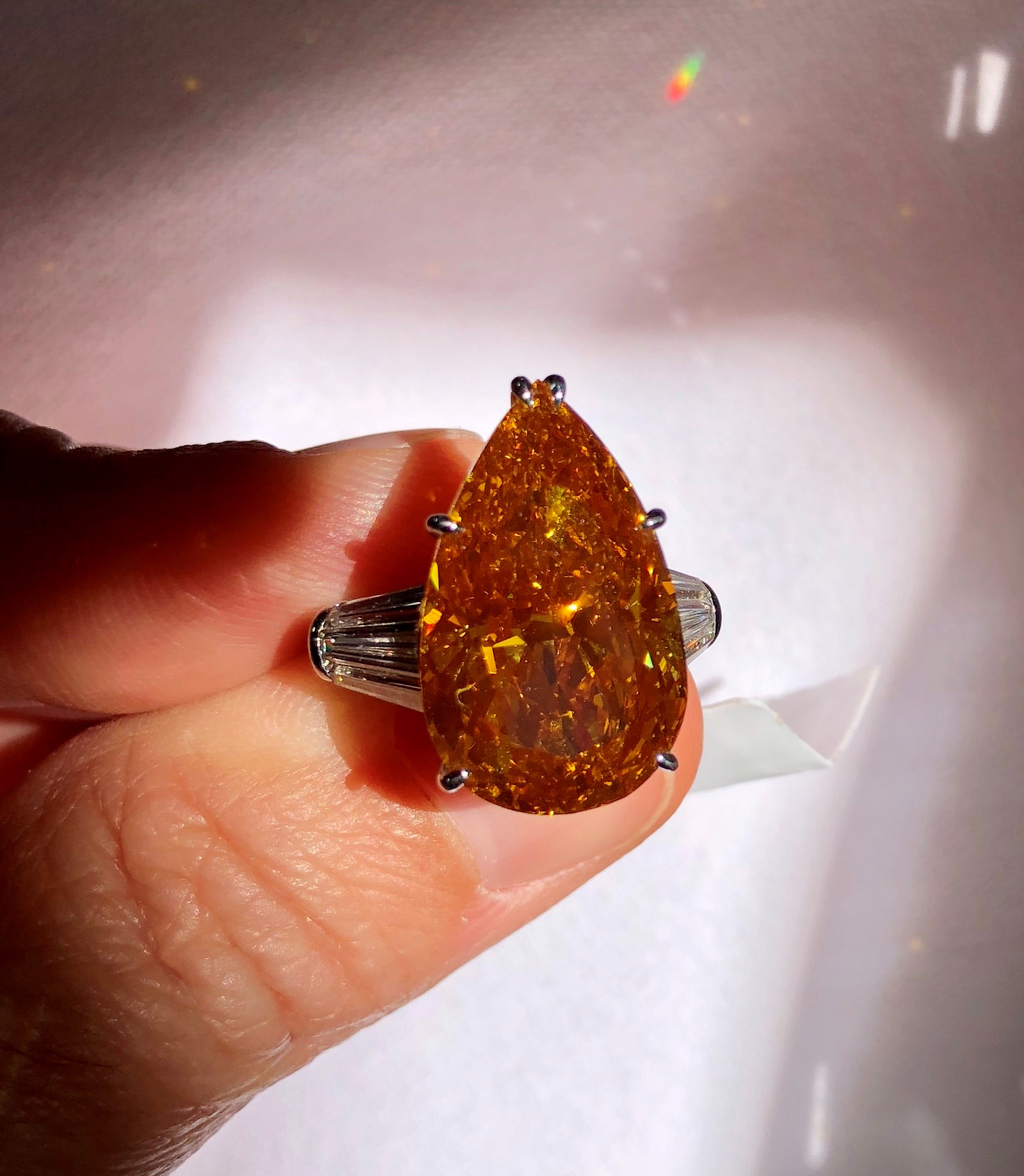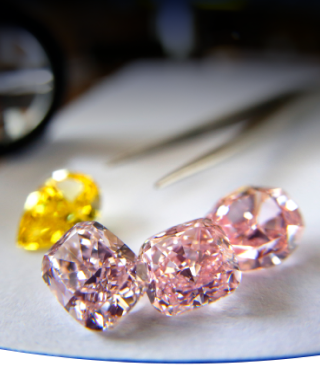Pre-Auction Analysis: Christie’s & Sotheby’s Geneva Magnificent Jewels May 15-16 2018
In this pre-auction report, we will focus on visual elements of some rare and unusual fancy color diamonds. We will also try to give you some interesting observations that are not expressed on the GIA report nor in the catalog.
Our analysis expresses characteristics such as Undertone, Color Dispersion, and Inner-Grade (UDI; a detailed explanation appears below). We use grades 1, 2, 3, and 4 (1 being the lowest grade). The grade 4+ is granted in rare cases and stands for an exceptional characteristic. Stones that receive a minimum total UDI score of 8, without any remark next to the grade, are considered to be “gems” and are probably suitable for high-end jewelry, collectors, and the investment community. A detailed explanation on our grading system is at the bottom of this article.
For your convenience we have added direct links for the GIA reports and some FCRF Rarity reports
All images in this article review were taken with an iPhone X – no filters were applied.
All auction valuations are per carat and in US Dollars.
Sotheby’s Auction – May 15th, 2018
Lot #374
2.63 carat fancy vivid purplish pink round modified brilliant cut, SI1
High catalog estimation: $1,138,684 per carat
It’s well known that round fancy color brilliant cut diamonds achieve the highest price per carat. The reason for that lies in the fact that there is very little one can do in order to concentrate the color and spread it evenly around the face up of the stone. In this case, whoever cut this 2.63-carat stone made a good job reinforcing the color within the limitations of a round shape and achieving the vivid grade. Unfortunately the stone cannot achieve the full premium for the shape simply because the bottom is modified and the depth percentage is 75. This is an extremely unusual depth for any fancy color diamond, nevertheless for a round.
As for the inner-grade, the level is average for a vivid purplish pink. In the mounting the stone exhibits a uniform color dispersion. However, outside of the mounting, it will most likely reveal a colorless frame in the crown area; the gold underneath the stone that covers 50% of the pavilion is taking care of that visual effect.
The undertone of this pink definitely exceeds the expectations of what we imagine a pink should be, what is called in the industry as “sweet pink”.
| Inner-Grade | Color Dispersion | Undertone |
| 3 | 3 | 4+ |
Total quality score: 10+
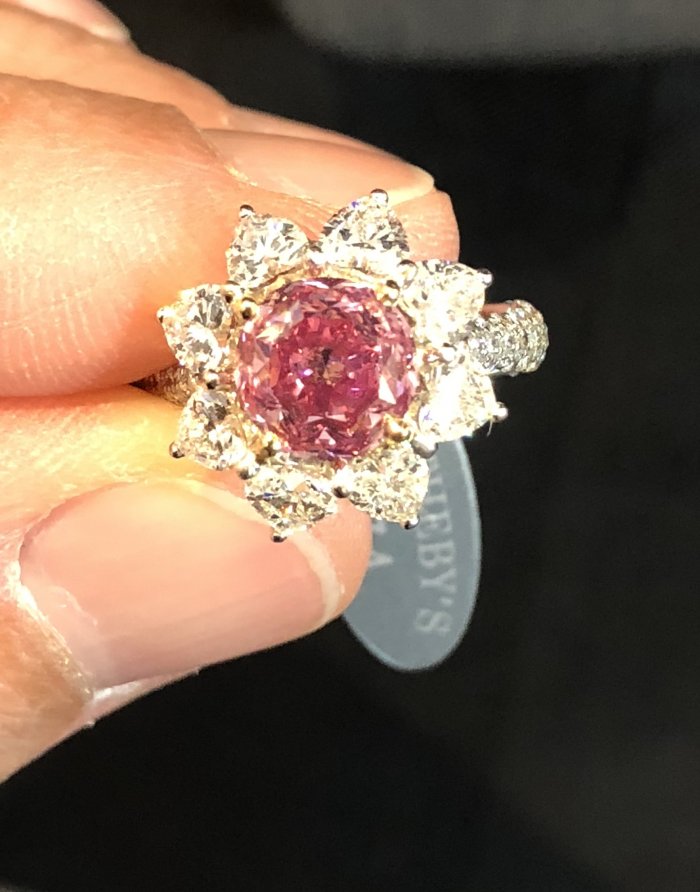
To review the GIA Report Click here
Lot #377
6.16 carat fancy dark gray-blue pear cut, SI1
High catalog estimation: $844,025 per carat
The marks, chips and bruises on this unique blue pear shape attest to the period and the tribulations that this gridless diamond underwent till this day. Although GIA graded this diamond as dark gray-blue, one can easily think he is looking at deep blue. Relative to a gray-blue stone it has a very good undertone.
| Inner-Grade | Color Dispersion | Undertone |
| 4 | 4 | 4 |
Total quality score: 12

To review the GIA Report Click here
Lot #367
5.04 carat fancy purple-pink pear shape, SI1
High catalog estimation: $356,929 per carat
A pink pear shape with a desirable “cold pink” undertone but with many colorless areas including the culet. The inner-grade is above average for the “Fancy” category.
| Inner-Grade | Color Dispersion | Undertone |
| 3 | 2 | 4 |
Total quality score: 9

To review the GIA Report Click here
Lot #370
18.19 carat fancy intense yellow step cut, VS1
High catalog estimation: $38,587 per carat
Looking at the facet alignment of this Emerald cut, it is reasonable to believe this diamond was polished decades ago. It is polished as a regular colorless diamond which results a very low color dispersion and a low inner-grade as well.
| Inner-Grade | Color Dispersion | Undertone |
| 2 | 1 | 3 |
Total quality score: 6

To review the GIA Report Click here
Lot #335
2.52 carat fancy vivid yellowish green radiant cut
High catalog estimation: $317,729 per carat
A green diamond with an exceptional undertone, probably due to the minor Influence of the yellow modifier. Because the stone is accompanied with a color report only, it is important to bring to your attention that the stone has a strong to very strong blue fluorescence and a noticeable black crystal underneath the table.
The brown patches around the girdle area are quite normal for a natural green diamond.
| Inner-Grade | Color Dispersion | Undertone |
| 3 | 3 | 4+ |
Total quality score: 10+ (color only report)
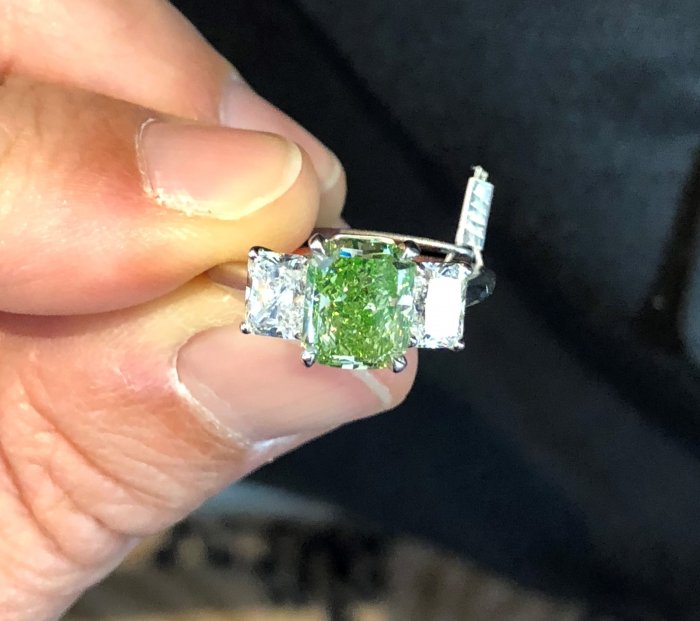
To review the GIA Report Click here
Lot #336
1.43 carat fancy deep bluish green cushion cut, SI2
High catalog estimation: $407,209 per carat
A pleasant undertone and a strong inner-grade, as most deep Fancy color diamonds have. The color dispersion is probably better in the mounting than it would be when it is loose.
| Inner-Grade | Color Dispersion | Undertone |
|
4 |
3 |
4 |
Total quality score: 11 (SI2)
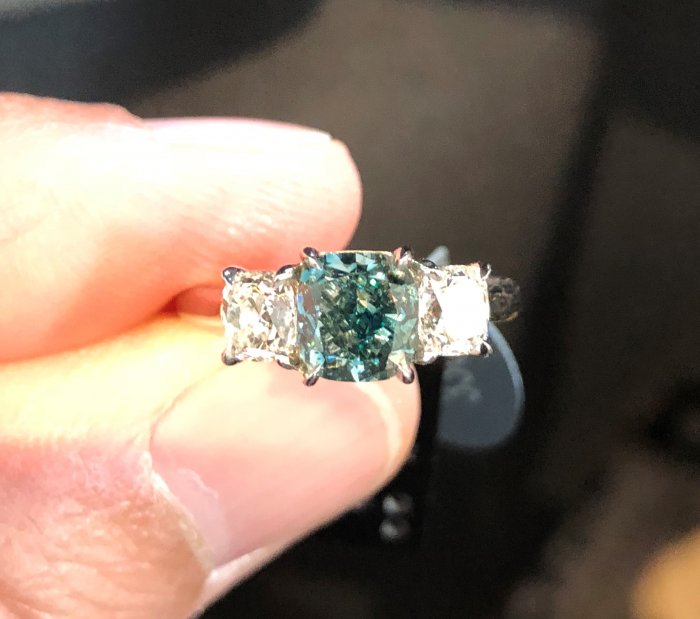
To review the GIA Report Click here
Lot #278
15.10 carat fancy vivid yellow modified brilliant cut, IF
High catalog estimation: $56,468 per carat
A vivid yellow with no green or brown undertone in the color composition and with some colorless areas. The inner-grade is above average.
| Inner-Grade | Color Dispersion | Undertone |
| 3 | 3 |
4 |
Total quality score: 10

To review the GIA Report Click here
Christie’s Auction – May 16th, 2018
Lot #418
5.03 carat fancy intense blue pear shape, SI2
4.16 carat fancy vivid yellow pear modified brilliant cut, SI1
High catalog estimation: $380,849 per carat
This blue pear has a good combination of all three elements. It has a strong inner-grade and has very little gray undertone. When mounted, the color dispersion seems very good; however, there is a good chance it will have some colorless areas once it’s out of the mounting. Although it is completely eye clean, the biggest caveat for the blue diamond is the SI2 clarity.
The vivid yellow pear shape has a strong inner-grade with no green or brown undertone and exhibits an absolute yellow. The color dispersion, on the other hand, is not compatible to the rest of its qualities.
Blue diamond score:
| Inner-Grade | Color Dispersion | Undertone |
| 4 | 3 |
4 |
Total quality score: 11 (SI2)
Yellow diamond score:
| Inner-Grade | Color Dispersion | Undertone |
|
4 |
3 |
4 |
Total quality score: 11

To review the GIA Report Click here
Lot #414
20.49 carat fancy vivid yellow rectangular cut-cornered, VVS1
High catalog estimation: $219,619 per carat

This vivid yellow Emerald cut has the strongest possible inner-grade for a yellow, alongside a very good undertone and color dispersion. Examining the stone on a white color paper (when placed face down), reveals a slight warm undertone which is hardly seen from the face-up view of the stone and doesn’t have a real, negative impact on the overall appearance.
| Inner-Grade | Color Dispersion | Undertone |
|
4+ |
4+ |
4 |
Total quality score: 12 ++
To review the GIA Report Click here
Lot #406
8.52 carat fancy intense purplish pink rectangular cut cornered, VVS1
High catalog estimation: $586,854 per carat
This 8.52 was recut from a round polished diamond, in sharp contrast to most re-cuts. The make of this radiant is quite good, leaving almost no marks from the previous shape. The undertone is very pleasant, showing a strong “cold” purple presence, and the color dispersion is average with a distinct but narrow colorless frame around the table. The inner-grade is low under natural daylight.
| Inner-Grade | Color Dispersion | Undertone |
| 2 | 3 |
4 |
Total quality score: 9

To review the GIA Report Click here
Lot #410
12.98 carat fancy deep orange yellow pear shape, VS2
High catalog estimation: $77,042 per carat
Interestingly, this orange-looking pear shape has two states of appearance: one with an unattractive dark undertone (with some brown flashes) under standard indoor lighting, and the other, looking completely different, with a strong orange hue when placed under direct sunlight. This phenomenon happens due to the glowing effect the yellow fluorescence has when it meets UV rays from the sun. The two images below clearly demonstrate this phenomenon.
| Inner-Grade | Color Dispersion | Undertone |
|
4 |
3 |
2 (indoors) |
Total quality score: 9
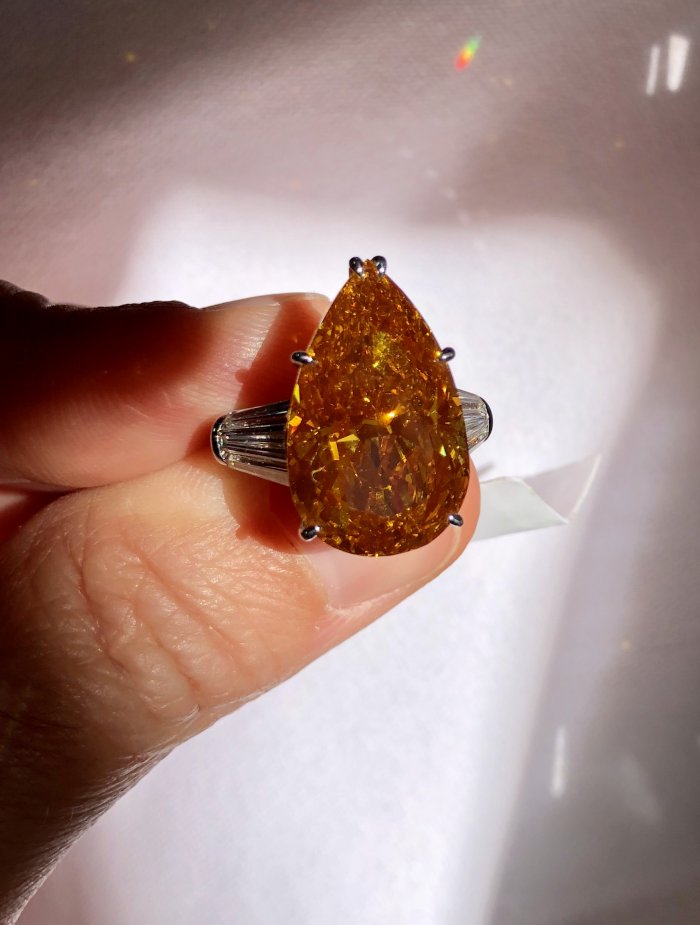
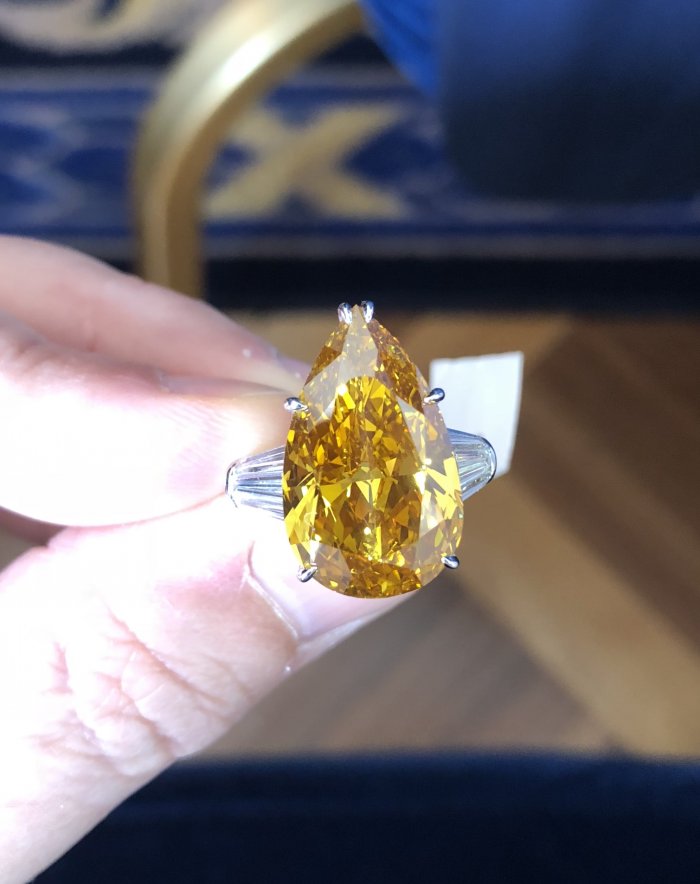
To review the GIA Report Click here
Lot #401
15.08 carat fancy vivid yellow radiant cut, VS1
High catalog estimation: $53,050 per carat
This vivid yellow Radiant cut diamond is a result of a re-cut polished round stone that was probably one saturation grade below. Due to the poor make on this radiant, there are many colorless areas in the stone. Although camouflaged quite well in the mounting, the inner-grade is above average and the undertone has no green or brown influence and exhibits an absolute yellow.
| Inner-Grade | Color Dispersion | Undertone |
| 3 | 2 |
>4 |
Total quality score: 9
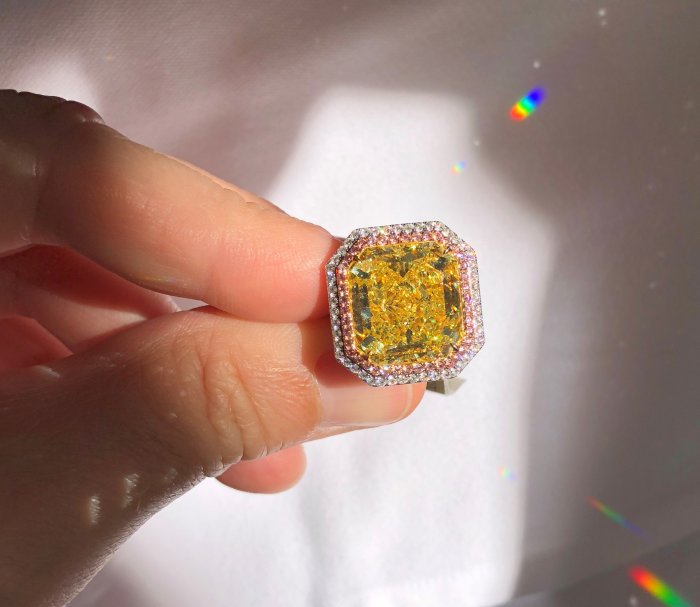
To review the GIA Report Click here
Lot #342
5.19 carat fancy intense purplish pink cushion mix cut, SI2
High catalog estimation: $385,356 per carat
A cushion cut that has a cold, attractive purple color, a high color dispersion, and an average inner-grade in the intense category. The SI2 clarity is a result of 5 to 6 transparent crystals (resembling bubbles) trapped in the diamond crystal underneath the table. They are invisible to the naked eye.
| Inner-Grade | Color Dispersion | Undertone |
| 2 | 3 | 4 |
Total quality score: 9 (SI2)

To review the GIA Report Click here
Lot #324
18.98 carat fancy yellow oval mixed cut, VVS2
High catalog estimation: $18,440 per carat
This oval is a re-cut from a different polished diamond that resulted in a low color dispersion. The top of the stone was made as a step cut and the bottom as a modified oval. Noticeable colorless areas are in the culet and on the “crown” area. The inner-grade is strong, and the undertone is average.
| Inner-Grade | Color Dispersion | Undertone |
| 4 | 2 | 3 |
Total quality score: 9

To review the GIA Report Click here
Lot #381
33.51 carat fancy light purplish pink rectangular cut cornered, VS2
High catalog estimation: $149,209 per carat
Some areas of this large pink diamond are milky, they are visible when viewed through the girdle. The inner-grade is low, and in direct sunlight, it loses most of its body color (a typical phenomenon for type IIa pink diamonds). The color appears mainly under the table, leaving the crown completely colorless. On one side of the girdle there is a large indented natural that may be visible to the naked eye (image attached).
Like most lots, there is no resemblance between the stone in real life to the catalog image.
| Inner-Grade | Color Dispersion | Undertone |
| 1 | 2 | 3 |
Total quality score: 6

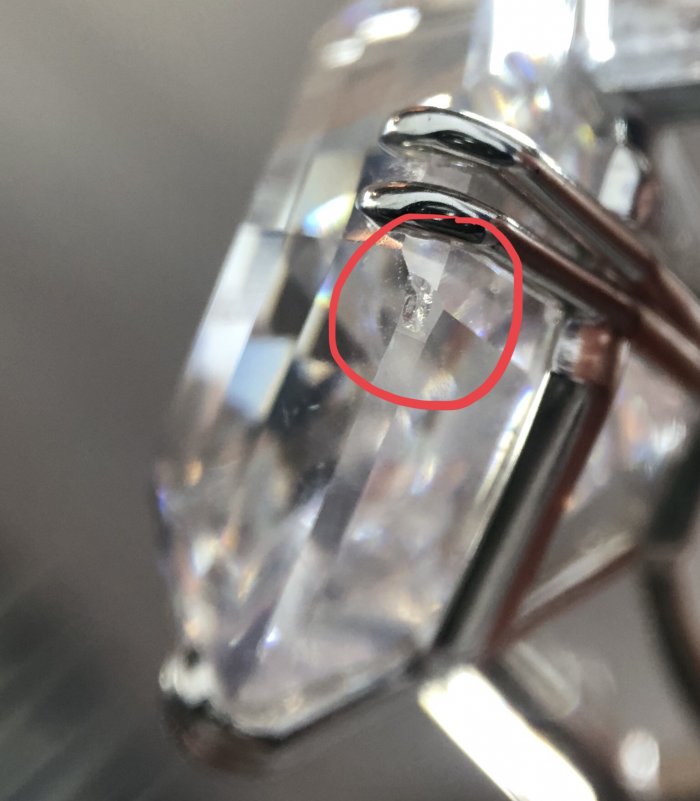
To review the GIA Report Click here
Lot #150
13.33 carat Fancy Deep Grayish Greenish Yellow rectangular cut cornered, SI1
High catalog estimation: $26,256 per carat
A misrepresentation of the catalog image may lead private clients to purchase this diamond and create disappointment. The undertone of this diamond is a result of a black “vale” in the crystal, and when placed face down on the table, one can see many dark/black areas. The inner-grade and color dispersion are obviously high, as most diamonds with a “deep” or “dark” grade are, but the undertone grade in this case is low.
| Inner-Grade | Color Dispersion | Undertone |
| 4 | 4 | 1 |
Total quality score: 9 (low translucency)
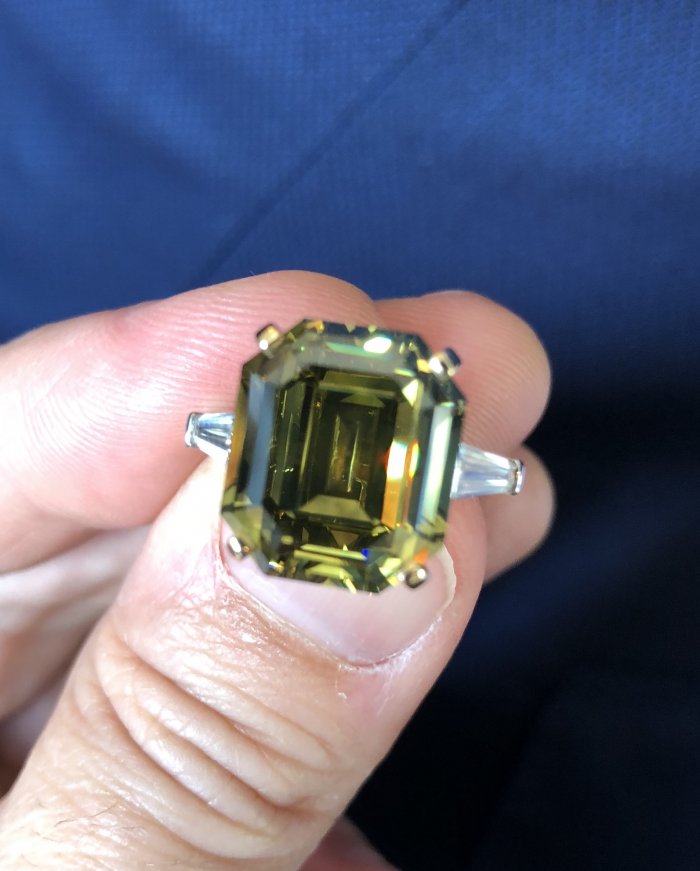
To review the GIA Report Click here
General
We use 1, 2, 3, 4, and 4+ to grade the three visual elements that GIA is silent about, that, however, impact value dramatically.
Inner-Grade refers to the strength of color within each GIA saturation category:
Grade 1 weakest, bordering the saturation below.
Grade 2 weak (most abounded).
Grade 3 full-bodied color (above average).
Grade 4 very strong saturation.
Grade 4+ applies for the vivid category only, exhibiting the strongest possible saturation (rarely seen).
Undertone refers to a subtle hue influence in the body color of the stone. For example:
A fancy blue diamond with a significant gray presence in its general appearance will be graded with a low undertone grade of 1. A fancy blue that has no gray influence and will be close to a primary blue will receive the grade 4.
In a pink fancy color diamond, a stone with a warm undertone (such as orange or brown) will receive a low undertone grade. A pink stone with a cold undertone (such as purple) will receive a high grade.
In yellow fancy color diamonds, low foreign influence or a light orange influence will grant the stone a high undertone grade. When the yellow undertone looks like a true primary yellow, it will receive the rare grade 4+. Green and brown undertones will grant a low grade in the yellow category.
Color Dispersion relates to how well the color is dispersed in the face-up view of a fancy color diamond, regardless whether the GIA grades the stone as even. A stone with many colorless areas will receive the grade 1, while a stone that exhibits its face-up view with no colorless patches will receive the grade 4+. Unlike the first two elements, color dispersion is not a gemological quality and has only to do with cutter proficiency.
